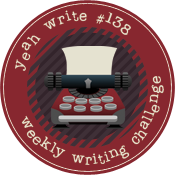I just finished a book about Harlan and
Anna Hubbard, a couple who chose to live a simple life on the banks
of the Ohio River. Written by Harlan, Payne Hollow details how
the Hubbards lived their day-to-day lives: building their home mainly
from scraps offered by the river and the woods; foraging, gardening
and raising goats for food; chopping wood; canning; doing laundry by
hand.
Harlan has this to say about their
choice:
"To buy bread and coffee, beans
and bacon from the store and pay for such inferior provender...does
not appeal to us at all. We catch fish for our own eating, get all
our living by as direct means as possible, that we may be
self-sufficient and avoid contributing to the ruthless mechanical
system that is destroying the earth" (page 162).
* * *
As I pulled into a gas station the
other day, my son asked why I was supporting this particular company.
"They had a spill, Mom."
"True," I replied. "But
every gas company is guilty of something. And every time we buy
gas...every time we buy anything...we're guilty as well.
I am guilty:
This morning, I picked out my produce
at the grocery store, sliding celery and broccoli and parsley into
long plastic bags. I grabbed a package of noodles that I could easily
make on my own. Olives and pretzels and salsa and cream...With each
item that went into my cart, I felt myself more and more dependent
upon those corporations I claim to despise.
For Christmas, we're getting our
youngest a cell phone, allowing him a degree of independence, yet
further enslaving ourselves to technology.
The long-term effects of cell phone use
are still unknown.
* * *
I see that the fracking companies are
petitioning to use the Ohio River to ship "wastewater"
headed for disposal in injection sites. When there is a river
accident, this water, laced with five hundred unknown chemicals, will
be released into the river, jeopardizing plant and animal life and
contaminating a supply that serves millions.
Advertisements on NPR encourage
listeners to think about it in terms of natural gas
production.
I've thought about it.
I'm not interested.
I'm not interested in giving in yet
again to big businesses who always get what they want, without
concern for long-term effects.
I'm not interested in permanently
removing water from the hydrological cycle.
I'm not interested in more injection
wells.
I'm not interested in seeing the Ohio
River destroyed.
Again, Harlan: "With the removal
of an old landmark, a tree, a building or a person, the character of
the countryside deteriorates. No amount of improvement can make up
for the loss; there is never a change for the better...This will be
the landscape the rising generation will know, and they will not
understand what has been lost" (page 160).
Harlan wrote this about a friend who'd
recently died. He could easily have been writing about the Ohio River
he loved.
* * *
I want to live the life of Harlan and
Anna. But I'm not sure I have the courage. Can I turn away from
Christmas presents and plastic bags? Natural gas and the internet?
Can I give up a lifestyle of comfort and convenience and
leisure--empty things upon which we place too much value?
I'd like to dream of possibilities.
I'd like to think about it.
I'd like to try.
Destroying the Ohio River will destroy
the Hubbards' dream.
It will destroy my own as well.
This was written for this week's Yeah, Write Linkup.

Kelly Garriott Waite on Google+Labels: Environmentalism, essay
